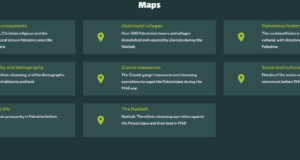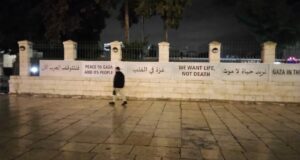by Donald Macintyre, 30th October
The Palestinian children of the West Bank grow up amid the sounds of guns and bombs. But a project inspired by Professor Nigel Osborne is determined to help them listen to a different tune. Donald Macintyre reports
The Reid Professor of Music at Edinburgh University, and one of Britain’s foremost contemporary composers, is somehow managing simultaneously to play the guitar, dance, and conduct a class of 30 children in their lusty performance – in Mandinga – of a West African folk song.
The song, he has explained to the children sitting round him, concerns a cunning spider, who, uninvited to a village feast, beguiles a villager who comes down to the nearby river for water, so that he never returns. Then another villager is sent. And so on, until the whole village has been mesmerised by the spider’s magical drumming. And then the spider runs to the now deserted village and consumes the feast.
The children, armed with shakers, triangles, chime bars and drums, enthusiastically beat out the rhythm as the words of the chorus – roughly transliterated as “Pigin do me so, kongo ayeri, ayeri kongo”- resounds through the open windows of the community centre, bringing to life a song created more than 1,000 years and a continent away.
The electricity brought to this room by the multi-tasking Nigel Osborne would be surprising enough even if it was not happening in the heart of the West Bank’s most populous-and most problematic- Palestinian refugee camp, scene of some of the worst bloodshed during the past six years of conflict.
This is Balata, a stronghold of armed militancy and the target of at times almost daily Israeli incursions, where 150 Palestinians have been killed since the intifada began six years ago. It is also one of the most densely populated places on earth, home to 30,000 civilians who live in less than two square kilometres of cement-block housing packed so closely together that fat people cannot squeeze into some of the alleys between them.
Professor Osborne, whose works have been performed by orchestras across the world from the Berlin Symphony to the Los Angeles Philharmonic, who has seen his operas play at Glyndebourne and the English National Opera, has come to Nablus to practise what he has preached for more than a decade: the huge potential of music to rehabilitate war-traumatised children.
He first asks the children to join him in singing a melodic African chant, increasing the volume and then reducing it to a whisper. Then he has them clap in time. Then he introduces them, still clapping, to the rhythm, then, with his guitar, to the tune, and then finally – for those that need it – to the words of an old Arab song: Aya Zeyn al-Abidin/Ir Wrd, Ir Wrd/Imfitah Baynil/Besatin [“Zeyn ul Abidin, you are like a rose that blooms in the garden”.]
“I have loved Arabic music for a long time – longer than you,” he tells the children through the interpreter Assim Eshtaya, 27, a school counsellor in Nablus. “I won’t say more, but longer. Now the notes in the song we learnt come from a very old traditional Arab scale.” He plays the notes on his guitar. “Now I have a proposal. Would you like to create a new song with Arabic music?”
And so, with Professor Osborne allowing the children to decide the words of the song, which he suggests should be about friendship, and then to choose the melody, note by note, the song comes into being: “Dear friends, friends for ever, friends for ever,” the whole group sings in Arabic.
Professor Osborne is here to support a project which he has inspired but which has been run by a tireless fellow Scot, trained counsellor and unpaid volunteer Sheena Boyle, who spent much of the summer training fourth-year Palestinian psychology students to oversee music sessions for traumatised children.
A UN children’s fund report in January declared that “Palestinian children are showing increasing signs of psychosocial distress, manifested in aggressive behaviour, low achievement, nightmares and bedwetting.” Palestinian social workers say that in a place like Balata, almost every child is traumatised to a greater or lesser extent.
Samia Tangi, 12, is the fifth of seven children. She has lived with an aunt since her divorced mother was jailed for helping to prepare a bomb for an attack in Israel. Her father is absent in Jordan. Samia, whose aunt says she weeps a lot, seems to enjoy being here. “I like what you are doing,” she tells Professor Osborne through the translator. “I liked it when we sang ‘Aya Zeyn’.” She shyly shows visitors two of the drawings she is keeping for her mother’s eventual return. One shows the refugee camp at night; the gate of her school – the sign Balata Girl’s School clearly written; Israeli helicopters flying over head; tanks in the streets, a boy throwing stones at them. Another – entitled “mum’s day” has a heart and a lighted candle.
Doha Bakr, 13, was six when she saw the body of her 18-year- old brother brought home at the beginning of the intifada. Her account, delivered without emotion fastens on a seemingly extraneous detail; how he had told his mother that he wanted to take a shower, but hearing the water would take time to heat up, walked to the nearby Jacob’s Well, never to return alive. He may have been throwing stones; he was shot in the head.
Mahmoud Diab, 12, is the boisterous life and soul of today’s session, shooting out his suggestion for the words like a rapper. Mrs Boyle says his mother told her he is unpopular because he is “too clever”, though at the music session he has made more friends. Like many children in the camp, Mahmoud still occasionally wets his bed. Yet he is politically precocious, saying he supports Hamas because “everyone is against them” . His mother said before the sessions started that he wanted to be a suicide bomber when he grew up; today, at any rate, he says he wants to be a ” scientist and a leader in an Islamic band”. He adds: “I like it here because it is fun and we make new friends.”
Professor Osborne’s belief in the therapeutic and transformational power of music in the most unpromising circumstances is no passing fad. He graduated in music from Oxford in the late 1960s (where as the composer of a Cinderella produced by Gyles Brandreth, he coached Eliza Manningham-Buller, future head of the British Security Service, to sing for her part as the fairy godmother).
He was a music therapist for a spell as a young man but it was as a human rights activist, enraged by the failure of the international community to protect Bosnia from Serb aggression, that he went to Sarajevo in 1993.
Horrified by the impact of the siege on children, he devised, with two Bosnian artists, the idea of running creative workshops for children caught up in the conflict. “The idea was just so the children could have a bit of fun,” he recalls. “I was surprised how the therapeutic idea emerged out of it.” For a visionary who has worked in several conflict zones, including Chechnya and Georgia, Professor Osborne has an unexpected streak of humility. He is careful to distinguish between clinical music therapy and the kind of session he is doing in Nablus, or those he ran in Sarajevo, and west Bosnia, where he was inevitably called – at least by journalists – “the Pied Piper of Mostar”.
But ever since noticing what he has described as the “palpable wave of energy” emanating from the Sarajevo children, he has believed passionately that “music assists these [traumatised] children, helping communication between individuals and within groups, creating trust joy, safety, cognitive repair and the incomparable self-esteem brought by creativity.”
In a forthcoming – and in part highly technical – paper, he also reviews recent scientific findings on the physical effects of music on the one hand and post-traumatic stress on the other to make a persuasive case that music can be useful in regulating some functions of the body, such as heartbeat and breathing, known to be disturbed by repeated shock or fear.
Post-traumatic stress causes in different victims the opposite extremes of both “hyperarousal”and unusually subdued behaviour, he says and describes how in his experience in Bosnia: “It was not unusual for generally melancholic and reticent groups to leave a session laughing or dancing, or groups … of hyperactive children to leave calm and focused.”
Certainly, the Balata community leaders seem delighted with the success of the project. Mrs Boyle’s July training sessions involved 90 children in three Nablus refugee camps – with others having to be turned away. ” During the month, the results were clear for everyone to see,” said Shaer Badawi of Balata’s Yafa centre. “The children were happier.”
Balata is a bleak place to grow up. Almost every alley and lane is decorated with a “martyr poster” showing dead men and boys carrying guns, whether they were in fact militants or not. These provide almost the only role model for young boys. On a tour of the camp, Professor Osborne met a nine-year-old boy who every day visits the grave of his father, a dead militant, while – not untypically – brandishing a frighteningly realistic toy M16.
Professor Osborne has no illusions that music will somehow stop all young people picking up real guns in the future. But he says: “I hope we can offer an alternative path, a path where human energy can be put to creative, not destructive purposes.”
The problem, of course, is money. Kamal Shoraty, the Palestinian co-ordinator of the project, would like to extend it across the West Bank. But the summer sessions were run on a shoestring budget of around £6,300; there are not even enough simple musical instruments for more than one session at a time.
Professor Osborne says that if he was Swedish he would have direct access to funds from the country’s development agency. But the Government has so far rejected appeals for funding, which depends on a few individual donors and Rotarian-type fund-raising events in Scotland. Yet Professor Osborne calculates that a mere £50,000 would allow children in eight Nablus centres to take part in one session a week throughout the year.
At a meeting of Balata community leaders last Friday to express their appreciation to Professor Osborne and Mrs Boyle, Ahmed Dwaikat, of the Palestinian union of psychologists and social workers, said that the musical sessions have helped to a “better view of school” in depressed and underperforming children. But that’s not all. “Here children feel they have to grow up very fast,” he said. “We want to give them the feeling that it’s all right to be a child, to enjoy the things that are for children.”
 International Solidarity Movement Nonviolence. Justice. Freedom.
International Solidarity Movement Nonviolence. Justice. Freedom.


